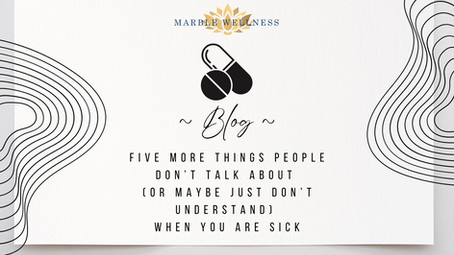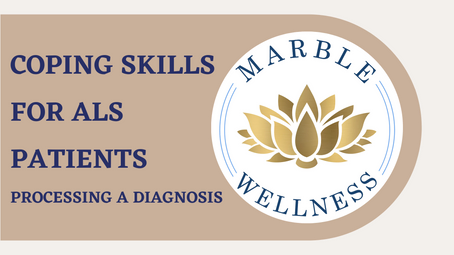by: Nicole Rhodes

When you’re diagnosed with illness, especially a chronic illness, each day can seem like a math equation to solve. How can I fit in work, balanced meals, movement, friendships, and appointments, when I only have so many spoons for the day?
Adding an extra thing in, like therapy for chronic illness, can feel like a scene from The Hunger Games … May the odds be ever in your favor.
Sure, we are biased, yet we wholeheartedly believe that therapy can help in your journey with illness.
Here are four ways therapy can help after you’ve been diagnosed with a chronic disease.
1. Therapy offers validation for your lived experience with chronic illness and thoughts surrounding it.
There’s no doubt that illness can be an isolating reality and your thoughts can go to new realms than ever before. Therapists are trained in holding space for the new and uncomfortable things that you think and feel when living with illness. While maintaining unconditional positive regard and true belief in you as the expert, your therapist might also suggest new ways of viewing a situation.
In the context of the therapy room, you won’t be hearing “yes, but at least….” like with some well-meaning but off-the mark friends. Or anything like “but have you looked on the bright side?” A therapist will be able to look at the situation frankly with you and give you that resounding “yep, this sucks and I see you.”
2. A therapist can help you identify strategies to use when the moments and days are hard.
You’ll work together to plan things you can build into each day, like walking around the block or sitting outside for 10 minutes, or tools you may use situationally, like mindfulness strategies or breathing exercises. Your therapist will meet you where you are and work with you to develop tools that are appropriate for your life.

The work to build those tools will include looking at which tool to use when; expectations of yourself during different emotional reactions; and other tailored approaches. This is how therapy for chronic illness can differ from Reddit threads; a general blog; or a podcast you’ve found on chronic illness…..all of those are helpful. But the difference-maker in therapy is the specificity to which your therapist will know you, your needs, and the best solutions for you + your needs.
3. Most simply, grief is a reaction to change.
And what is illness, if not change in how our body operates or the way we are able to move about the world? Therapy can help process the big and small grief that you are experiencing as illness transforms your world now and in the future.

Plus, our chronic illness therapist also has advanced training and professional experience in grief and its impact on all aspects of life. This means that her approach to therapy can really target this bypassed, but very impactful, piece of the adjustment to life after a chronic illness diagnosis.
4. Therapy can help identify your priorities and what you value most in life.
Conversations about what brings you meaning or what allows you to feel your best can help guide decisions you make in the future about treatment or how you spend your time. Therapists are trained in noticing trends in communication and behavior, and can even catch on to the things you aren’t saying, too. These conversations can lead to greater discussion and action in other areas of your life, including:
- Learning how to ask for help. It’s totally an understatement to say that asking for help can be a hard thing to do. After some discussion, though, about the areas in which you want to focus and the supports available to help you, conversations about help may feel a little lighter. You can even use your time in therapy to practice how you might go about asking for help so that it doesn’t feel so hard the first time you do it.
- Establishing boundaries. Illness is inherently exhausting – the physical pieces, the social considerations, the thinking and re-thinking … Establishing boundaries with ourselves and others is critical to maximizing mental and physical health. Therapy can simultaneously highlight the things that energize and deplete your energy quotas. From there, you can identify and set needed boundaries to protect your health: people and conversations to limit, the chores you won’t do, the labels you won’t assign to yourself, the activities you won’t engage in, etc.
- Focus on what you can do. As illness unfolds, it may seem like your list of “can’ts” is much greater than your list of “cans” – diet restrictions, activities to avoid, and so on. Your therapist will hold space for the grief of what’s changed and help you highlight the things you can do, with or without adjustment.
Therapy isn’t just for the ill person, either.
If you are the caregiver, child, or friend of someone is experiencing a life-changing diagnosis, you can experience the same benefits of therapy as the person who is sick.
Validation, processing grief, and strategies in asking for help are beneficial for everyone with a connection to illness.
These four examples are just a drop in the bucket of ways that therapy can help after chronic illness has imploded your world.
You might even find that therapy can help you process other hurts in your life as you develop a relationship with your therapist. You deserve the time and space to focus on you – maybe the spoons can grow with you!

Chronic Illness Therapy in Missouri
Marble Wellness is a counseling practice located in Ballwin, MO and Chicago, IL. One of our specialties is counseling for chronic pain and chronic illness! We have an in-house therapist dedicated to partnering with clients seeking the mental and emotional support they deserve at any point in their journey in dealing with a chronic illness. Nicole Rhodes has done extensive training, including with the Beck Institute, to gain approaches, interventions, and deeper understanding of how to help clients reach the best outcomes when they come in for therapy for chronic illness.
Give us a call today so you can get started on your journey to living calmer, happier, and more fulfilled…..even in the midst of chronic disease.
Contact Us!

Additional Counseling Services at Marble Wellness in St. Louis, MO and Chicago, IL
Counseling services designed to help set you on a path of living a more fulfilled, calm, and happy life.
St. Louis
Our St. Louis team of therapists have a variety of training backgrounds and areas of expertise. We specialize in anxiety, depression, grief, chronic illness, therapy for men, couples, and maternal overwhelm. We can also help new moms with various postpartum concerns, moms in the thick of parenting, and moms with teens. We can also chat from wherever you are in the state with online therapy in Missouri and online therapy in Illinois. No matter where you are in your journey, we would love to support you.
Chicago
Our Chicago team of therapists offer a wide range of mental health services to help our clients through the different challenges and hurdles in their life. In addition to anxiety, depression, grief, therapy for men, and maternal overwhelm, we are specialized in professional burnout, therapy for breakups, and love partnering with working moms.



